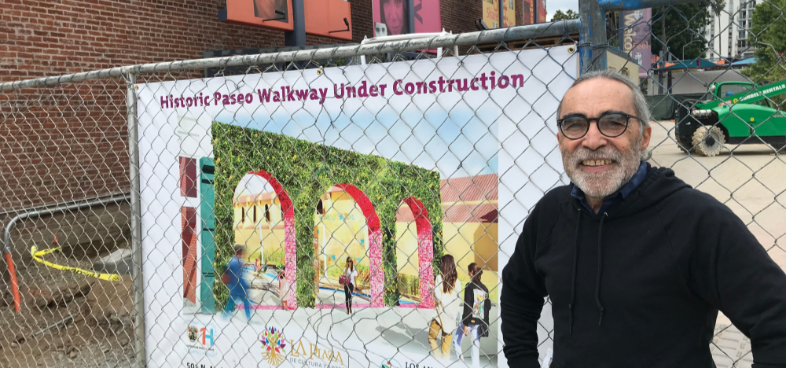The landlord in line to receive what looks to be an inexplicably favorable lease rate for a portion of a property the City of Los Angeles plans to convert into a homeless shelter paid more than $500,000 to settle prior money laundering charges, according to federal, state and city documents and reports.

State documents indicate Moiz Kaboud is chief executive of B.F.P.Z. LLC, the entity identified as the landlord of the building in the city’s lease agreement for about 17,900 square feet of space at the warehouse at 1426 S. Paloma Street, on Downtown’s industrial edge.
Documents indicate a Maurice Kaboud also is tied to the Paloma Street property, while at least one state filing shows the names of Moiz Kaboud and Maurice Kaboud used interchangeably.
Various accounts of the deal for the homeless shelter reported by other media outlets have meanwhile identified a Michael Kaboud as the owner of the property.
None of the various federal, state and city documents reviewed by SullivanSaysSoCal lists any Michael Kaboud.
The Moiz Kaboud listed as chief executive of B.F.P.Z. LLC, meanwhile, appears to have figured prominently in a money-laundering case that apparently started in the late 1990s.
“Postal Inspectors determined that, between June and December 1999, more than $300,000 worth of Postal Service money orders had been purchased in structured transactions at Post Offices in Los Angeles,” according to the U.S. Postal Inspection Service’s Annual Report of Investigations for its 2005 fiscal year. “They found that a payee named Reza Saderion deposited the money orders to his account at Manufacturers Bank, LA, with Moiz Kaboud named as power of attorney. Further investigation by Inspectors revealed that Moiz Kaboud controlled all deposits and withdrawals to the account, including $102,700 in cash, $342,000 in postal money orders, and $26,200 in Travelers checks. The funds were later withdrawn via large cashiers checks, which were used to purchase a liquor store and a bank certificate of deposit.”
The U.S. Attorney’s office pressed a case against Moiz Kaboud and several alleged co-conspirators, calling for the forfeiture of a number of properties, including 1420 Paloma Street – an address that includes the building identified as 1426 S. Paloma Street by city officials for purposes of the lease for the homeless shelter.
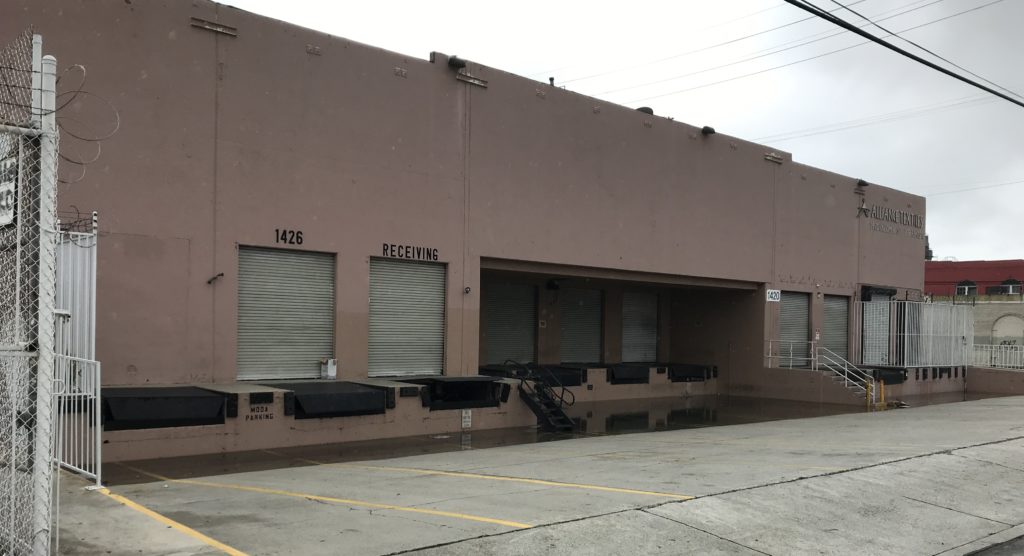
Federal prosecutors settled the case against Moiz Kaboud in civil court, accepting payment of more than $500,000 in lieu of forfeiture of properties.
Neither Moiz Kaboud nor Los Angeles Mayor Eric Garcetti – nor 14th District City Councilmember Jose Huizar, who is the chief proponent of the Paloma Street plan – has responded to requests for comment on the prior case of money laundering or other outstanding questions about the lease deal on the Paloma Street property.
One of a number of outstanding questions about the lease deal is why officials agreed to maintain a full rental rate of $35,000 a month to Moiz Kaboud through B.F.P.Z. LLC after discovering the city would get only half the space it had originally agreed upon.
Columnist’s View
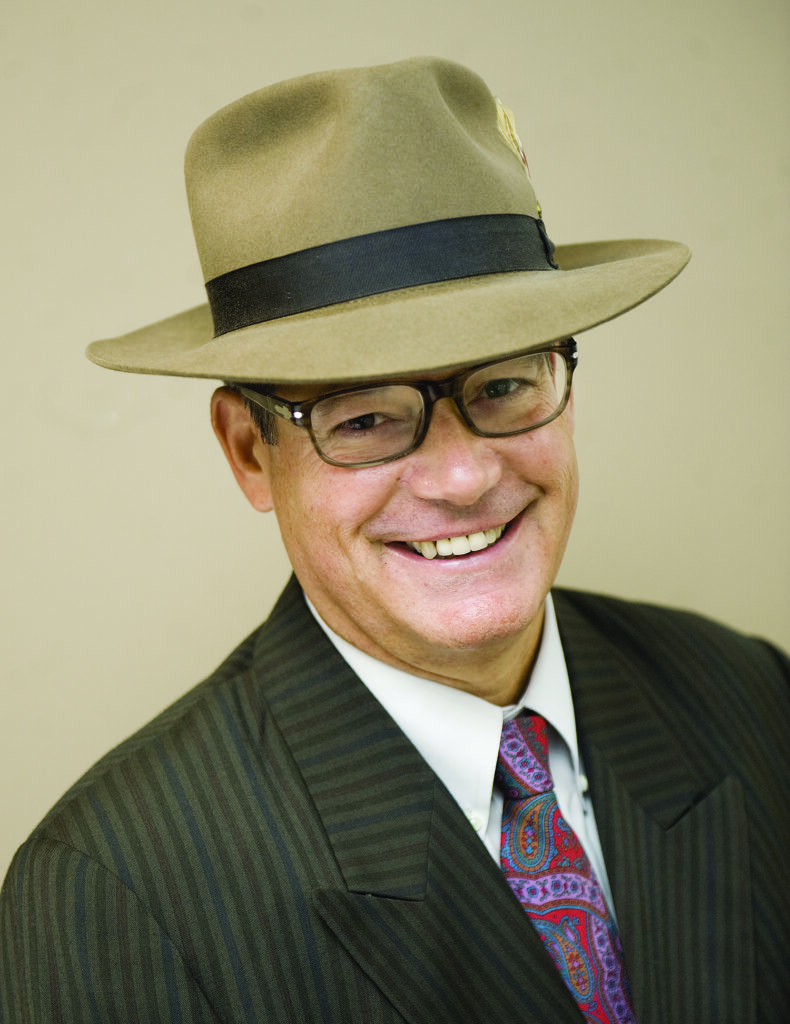
Moiz Kaboud is a private person and has every right to disregard any inquiries from SullivanSaysSoCal or the general public.
SullivanSaysSoCal, meanwhile, has every reason to note and consider that Kaboud’s record demonstrates that he has some experience in accumulating cash and attempting to hide his possession and use of the stuff.
All signs point to a lease deal that gives Kaboud about twice as much money every month than the city determined his space on Paloma Street is worth as recently as late last year. That comes to an extra $17,500 every month, based on the city’s original estimate of the market for the space.
SullivanSaysSoCal also hears from sources close to Huizar that he has some experience in accumulating and hiding his possession and use of cash, too. There’s reason to believe federal investigators might have found that much out when they raided Huizar’s house in El Sereno – especially, knowledgeable sources say, if they checked for false walls in at least one of the closets there.
A number of questionable terms of the lease deal on Paloma Street have been laid out in detail – readers can check past issues at SullivanSaysSoCal.com for a refresher.
Huizar’s status as a target of a federal corruption probe has been common knowledge for months.

Kaboud’s status as landlord of the Paloma Street property and experience as a handler of large sums of cash add another factor to the equation – and everyone can do their own math and let their own answers form the basis for their own questions on the lease deal and Huizar.
Then add this to the list: What might have motivated Mayor Garcetti and Huizar’s colleagues on the City Council to sign off in lockstep on a deal with terms that veered so plainly out of line as a result of the reworked terms that cut the amount of space but maintain a full payment of $35,000 a month?
Doti’s Half Marathon Doubly Impressive
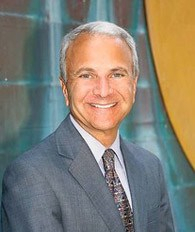 Chapman University President Emeritus Jim Doti has run more than 50 marathons, including 10 of the Boston variety.
Chapman University President Emeritus Jim Doti has run more than 50 marathons, including 10 of the Boston variety.
But his completion of a May 5 half marathon – part of the SDCCU OC Marathon – might have been his most impressive accomplishment as a runner.
Doti covered the 13.1-mile course six weeks after donating a kidney to Jose Talento of Santa Ana.
There’s always more to the story with Doti, who didn’t know Talento before donating the organ but quickly found common ground that goes beyond the flesh and blood of the medical tale.
“Jose and I both have two children (older boy and younger daughter),” Doti wrote. “He takes care of doves and I take care of my chickens; and he is a wood worker and I turn wood bowls. So I didn’t give my kidney to a stranger but to a kindred spirit.”
Capital & Main’s Many Intersections
 The latest intersection of LA and OC comes at Capital & Main, a digitally based, left-leaning and nonprofit outfit that promises “fact-based reporting, not opinion” as it goes about “Investigating Power & Politics” – one of its various taglines.
The latest intersection of LA and OC comes at Capital & Main, a digitally based, left-leaning and nonprofit outfit that promises “fact-based reporting, not opinion” as it goes about “Investigating Power & Politics” – one of its various taglines.
Little wonder, given the mention of power, that this item also will intersect with Bunker Hill, Newport Center and the Financial District in San Francisco in the next several paragraphs.
 Let’s start with the relatively modest locale for a May 10 party hosted by Capital & Main Publisher Danny Feingold and his team, which includes five newsroom staffers. Guests got a look at their new suite of offices, which come with sweet views from the 7th floor of the Citibank Building at Sunset Boulevard and Park Avenue, the tallest structure in Echo Park.
Let’s start with the relatively modest locale for a May 10 party hosted by Capital & Main Publisher Danny Feingold and his team, which includes five newsroom staffers. Guests got a look at their new suite of offices, which come with sweet views from the 7th floor of the Citibank Building at Sunset Boulevard and Park Avenue, the tallest structure in Echo Park.
The new offices have been made possible by financial support from labor unions and other organizations – a list of backers includes the James Irvine Foundation, which traces its founding to a fortune based on the Irvine Ranch, which in turn accounts for about a fifth of the land in present-day Orange County.
The James Irvine Foundation shouldn’t be confused with the present-day Irvine Company, though – nor with the Donald Bren Foundation, which is named for the developer’s current owner.
Bren has been the driving and animating force behind the development of the Irvine Ranch ever since the Irvine Foundation sold the last of its shares in the operation more than 40 years ago. Bren’s leadership has been crucial to the development of the City of Irvine, Newport Center, and Newport Coast, among other parts of OC. He’s also responsible for the donation of more than 57,000 acres that have been set up as open space and parklands for perpetuity.
The James Irvine Foundation shouldn’t be confused with the Joan Irvine Smith and Athalie R. Clarke Foundation, either. That one is named for some heirs of the family, and it specializes in supporting environmental work, with a particular focus on water.

Indeed, the James Irvine Foundation is a long way from the ranch these days and is backing Capital & Main’s mission of “Investigating Inequality Across America” – another tagline for the news operation.
The foundation, however, doesn’t shy away from the corporate scene or high-end addresses, with a headquarters at the toney One Bush Street in the Financial District of San Francisco to go with an office at The Bloc at 7th & Flower in the Financial District of LA.
All of that proximity to financial interests and experts makes sense for an organization that has managed to sustain itself while making more than $1.8 billion in grants to various nonprofits since its founding in 1937, with nearly $100 million last year.
 The James Irvine Foundation lays claim to another tie to both LA and the world of high finance with the presence on its board of John Frank, who’s also a director for Chevron and serves in his day job as vice chair of Oaktree Capital – a Bunker Hill investment house with more than $100 billion in assets under management.
The James Irvine Foundation lays claim to another tie to both LA and the world of high finance with the presence on its board of John Frank, who’s also a director for Chevron and serves in his day job as vice chair of Oaktree Capital – a Bunker Hill investment house with more than $100 billion in assets under management.
Kudos to Frank, who has been known to keep high ideals and a low profile that counter the sort of stereotypes often applied to big shots of the financial world.
And congratulations to Capital & Main, which seems to realize the value of foundations whose supporters reach beyond the stereotypes that abound in today’s journalistic and political climate, which has too little to do with fact-based reporting.
Why is Moderate Majority Silent?
Here’s another reminder that there are alternatives to the slash-and-burn approaches to journalism and media that often are fueled by stereotypes and shot through with opinions that don’t represent a majority of us.
This one comes with an explanation of why it sometimes feels that way, though – and some ideas about what might change the trend.
This was written for Zócalo Public Square:
By Jaime Settle
It’s not hard to understand why moderate opinions are absent among cable television talking heads. Moderation doesn’t sell. But why aren’t moderate viewpoints more prominent among the forms of mass communication to which the largely moderate public contributes – social media sites like Facebook?

The absence of moderate voices – an empirical reality confirmed by research – distorts our views. Americans believe they are more polarized and divided than they actually are.
So how can social media platforms become more inviting for less extreme opinions? The most successful solutions involve tweaking platforms to highlight the perspective of users who are part of the solution to polarization, and not part of the problem.
The good news is that, while moderation is missing in our media, moderates exist in large numbers in our country. The trouble is that moderation tends to go hand in hand with lower interest in and knowledge about politics. And those with less confidence in the accuracy of their viewpoints may be hesitant to speak up.
Thus, what won’t work is incentivizing moderates to speak up more about their political opinions. They don’t. And even if they did, their fellow users might not recognize subtle opinions.
The Facebook platform is well-designed to foster the out-group homogeneity effect. That term refers to how the act of identifying others as members of an out-group increases our propensity to think that they are all the same. In other words, people are inclined to attribute too much extremism and consistency to their opponents.
So, the solution to moderating the polarizing forces of social media starts with staying away from politics, at least on the surface.
Interestingly, Facebook users are usually accurate in inferring the political identities of other users based on the nonpolitical content they post. This mapping of nonpolitical cues to political identities reinforces the idea of a large gulf between political parties.
But, in reality, not everyone who drives a Prius is a Democrat, nor do all pickup truck drivers identify as Republicans. So, to alter the polarizing effects of social media, we need to make the signals linking social characteristics and policy preferences noisier. Kale-eating conservatives and country music-loving liberals must share more about themselves to highlight the full diversity within each political party. Having partisans complicate their own stories could reduce the perception of social polarization.
 Moderates have an equally important role to play.
Moderates have an equally important role to play.
Moderates often demonstrate tolerance for differing viewpoints in what they read, like, and comment upon.
Social media companies need to alter their platforms in ways that reward users who play nicely in the sandbox. For example, Facebook could alter the news feed algorithm to lower relevancy scores for emotional political speech, ensuring that dispassionate communication is more likely to circulate on the site.
Another solution stems from the finding that the people most inclined to “like” content posted by people in the opposing political party are frequent Facebook users who are the least partisan. We could harness the judgment of these tolerant moderates by altering the news feed algorithm to assign a higher relevancy score to political content that these users like. Such users are more likely to be situated in networks with a diversity of political opinions.
While some causes of social media polarization are best left to governments (eliminating foreign interference in elections) or to private companies (extirpating hate speech), we shouldn’t abdicate our own responsibility as citizens to contribute to fixing the problem.
Jaime Settle is an associate professor of government at the College of William & Mary and a scholar of American political behavior. She is the author of Frenemies: How Social Media Polarizes America.
LA Plaza’s Push for Paseo
Abelardo de la Peña Jr. has every reason to be excited about the Paseo Walkway that will give LA Plaza de Cultura y Artes a distinguished point of entry on Main Street, just south of Chinatown and west of Olvera Street.
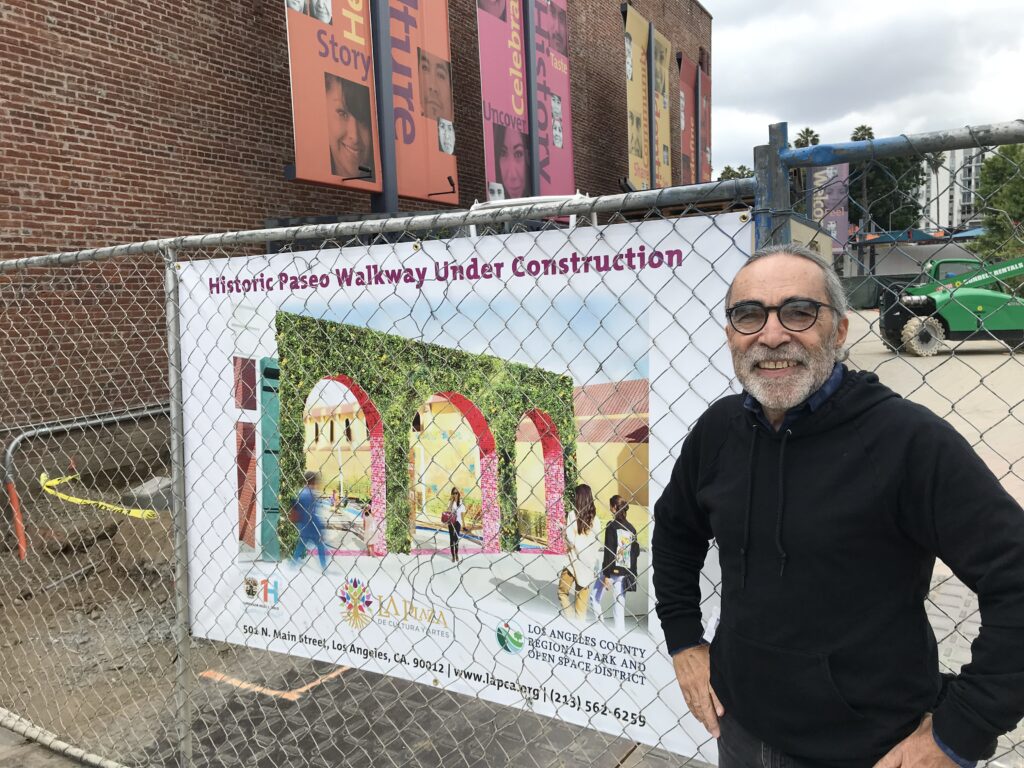
The director of marketing and communications of the story-telling museum also has cause to keep a close eye on the calendar as work proceeds on the block-long path, which will run between the museum and historic La Placita Church.
De la Peña reports that Rock-n-Roll Hall of Famer and Latin music legend Linda Ronstadt expects to stroll the completed Paseo as a guest of honor at LA Plaza’s 8th Annual Pobladores Awards Gala, a fundraiser set for the evening of June 26.

Ronstadt and Latino American winners of James Beard Awards, given to top culinary professionals, will be honored for their contributions to art and culture.
Will the Plaza Paseo path be done in time?
Go to the gala to find out – visit 2019AwardsGala.Eventbrite.com for individual tickets, sponsorships and advertising; or contact Kimberly Chávez, director of development and membership, at 213 542-6275 or kchavez@lapca.org.
See Sonny’s Specialties
Visitors to the Pacific Council on International Policy’s annual Global Los Angeles Summit, held May 10 at the Omni Hotel on Bunker Hill, had every reason to be impressed by the trailer for a documentary that’s getting finishing touches under the guidance of Sonny Astani, who has brought his training as an engineer, involvement in higher education and passion for problem-solving together on the project.

Astani is a real estate developer by day and a citizen of the world all the time. He has an extraordinary ability to study a streetscape and pick up insights on the rhythms of life that few might understand in any given city or section of town or smaller neighborhood. He also maintains an expansive view of the world, informed in part by his own experience as an immigrant and his ongoing participation with the Pacific Council.
Astani’s experiences led to this trailer for the full documentary, which he eventually plans to post on YouTube.
Sullivan Says
LA’s Golden Triangle of coffee runs from the cardamom latte at Olson’s Scandinavian Deli in Mid-City to the cortadito at Don Francisco’s at the Spring Arcade in the Historic Core of Downtown to the sea salt coffee at 85 Degrees Bakery Cafe on Wilshire in Koreatown.
